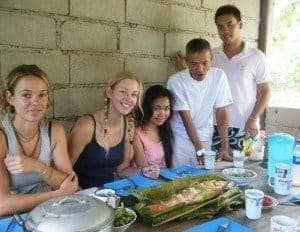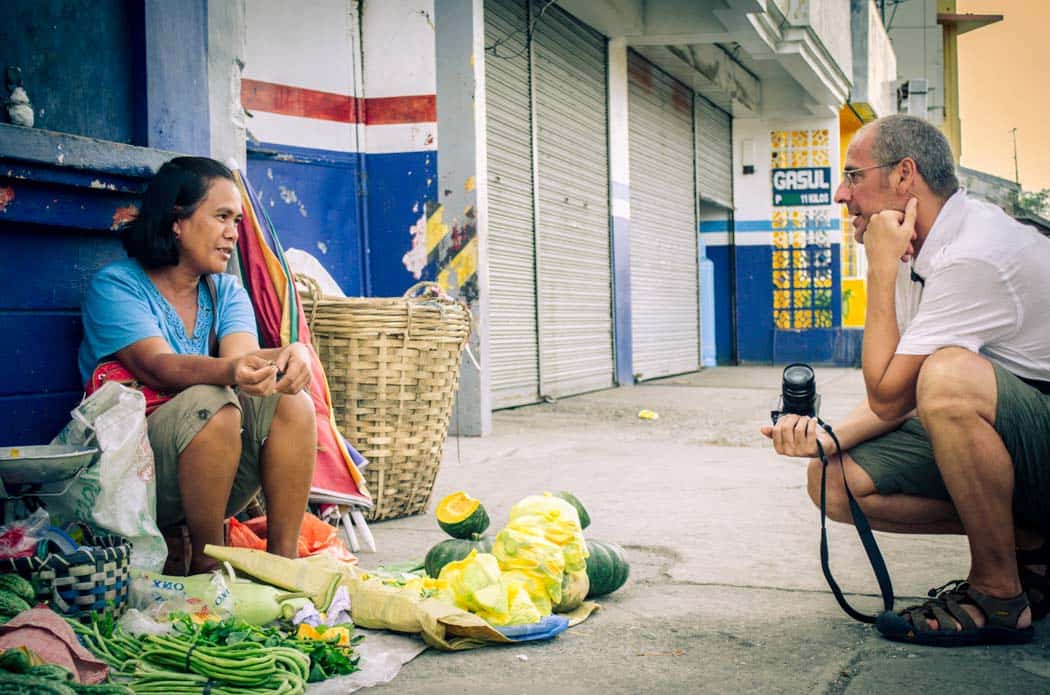The Filipino language basically originated from the Tagalog language — one of the major languages spoken by people from the Tagalog regions in the island of Luzon. It is predominantly spoken in Metro Manila, the national capital of the country.
During the last half century, it has absorbed many foreign expressions, mostly American English and a lot of Filipinos combine Tagalog (Filipino) and English words when speaking, called Taglish.
Below is a list of common Tagalog words you might want to learn when traveling to the Philippines. Filipinos love it when foreigners try to speak their language and these Filipino phrases should give you a great head start.
TIP: Tagalog words are pronounced as they are spelled.
Filipino Greeting Phrases

Filipinos are generally warm and welcoming to foreigners. They are always helpful and hospitable. They are also very accommodating and its easy to befriend them. In 2015, there were more than 5 million visitors to the Philippines.
| Welcome | Mabuhay |
| Hello | Kamusta/Hi/Hello |
| Good morning | Magandang umaga |
| Good afternoon | Magandang hapon |
| Good evening | Magandang gabi |
| How are you? | Kamusta ka? |
| I’m fine, thank you. | Mabuti naman, salamat |
| Long time no see | Matagal na tayong hindi nagkita |
| Take care | Mag ingat ka |
| Please come in | Pasok po kayo |
| Feel at home | Huwag kang mahiya |
| Happy Birthday! | Maligayang kaarawan! |
| Merry Christmas! | Maligayang Pasko! |
| Happy New Year! | Manigong bagong taón |
| What’s your name? | Anong pangalan mo? |
| My name is… | Ako ay si…. |
Filipino Phrases for Getting around & asking for directions

You can approach anybody and ask for directions. They are all eager to help. Just choose whom to ask. It’s better to approach a policeman or security guard. And as much as possible, never travel alone for safety reasons. And don’t flash your gadgets or cash in public except within safer environments, here are some Filipino phrases to help you get around.
| Where is….? | Saan po yung…? |
| What time is it? | Anong oras na? |
| Are you sure? | Sigurado ka? |
| Left | Kaliwa |
| Right | Kanan |
| Go straight | Diretso lang |
| Where do you live? | Saan ka nakatira? |
| Sorry, I beg your pardon? | Pasensya na, paki ulit po? |
| Can you speak slowly, please? | Paki ulit po ng dahan-dahan |
| I don’t understand | Hindi ko maintindihan |
| I don’t know | Hindi ko alam |
| When? | Kailan? |
| Tomorrow | Bukas |
| Now | Ngayon |
| How much? | Magkano? |
| Stopping a jeep/bus/taxi | Para po |
| Here’s my fare | Bayad po |
| Stop | Hinto |
| Go | Go/andar |
| Thank you | Salamat po |
| What is this? | Ano ito? |
| Excuse me (when passing through) | Paraan po |
| I am lost | Nawawala ako |
| Can you show me? | Pwede mo ipakita sa akin? |
| It’s near here | Malapit lang dito |
| It’s far from here | Malayo dito |
| I’m looking for (name) | Hinahanap ko si… |
| One moment | Sandali lang |
| Hurry! | Bilis! |
| Help! | Saklolo! |
| Thief! | Magnanakaw! |
| I’m okay | Okay lang ako |
| It’s urgent! | Ngayon na! Importante! |
| Calm down | Relax lang |
| This is nonsense! | Kalokohan! |
| I’m not interested | Hindi ako interesado |
| Can I help you? | Meron ba akong maitutulong sayo? |
| Dirty | Madumi |
| Clean | Malinis |
| Is this seat taken? | May naka-upo ba dito? |
| I don’t like it | Ayaw ko nito |
| Cold | Malamig |
| Hot | Mainit |
| Go fast | Bilisan mo |
| Go slow | Bagalan mo |
| I have no money | Wala akong pera |
Filipino Phrases for Dining & Eating

Filipinos love and enjoy food especially their own cuisine. Food in the Philippines take inspiration from Chinese, Indian, American and specialties from the local regions. All-time favorite Filipino dishes are the Sinigang (meat and vegetables in a tangy soup) and Adobo (pork and/or chicken flavored with garlic, pepper, vinegar, and soy sauce). You will also find that Filipinos eat with a spoon and fork, an easier way to eat rice along with the dish. Rice is a staple in all of the meals.
When you enter a home and people are eating, they will always invite you to join them. They will not be offended though if you decline especially if you are an unexpected guest. But if the meal is planned, expect a feast offered by your Filipino host. Here are some Filipino phrases to ensure you get the most out of your eating experiences.
| It’s time to eat! | Kain na tayo! |
| This is delicious! | Masarap ito! |
| I don’t like it | Hindi ko gusto/type |
| Sorry, I don’t eat… | Pasensya na, hindi ako kumakain ng… |
| Cook (verb) | Luto |
| Sweet | Matamis |
| Salty | Maalat |
| Sour | Maasim |
| Bitter | Mapait |
| Hot (pepper) | Maanghang |
| Crunchy | Malutong |
| Soft | Malambot |
| Rice | Kanin |
| Bread | Tinapay |
| Pork | Baboy |
| Chicken | Manok |
| Beef | Baka |
| Vegetables | Gulay |
| I don’t eat pork | Hindi ako kumakain ng baboy |
| I don’t drink (alcohol) | Hindi ako umiinom ng alak |
| What do you call this dish? | Anong tawag sa ulam na ito? |
| Spoon | Kutsara |
| Fork | Tinidor |
| Knife | Kutsilyo |
| Plate | Plato |
| Drinking glass | Baso |
| May I have a glass of water? | Pwedeng makahingi ng isang basong tubig? |
Filipino Phrases For Dating & Romantic Expressions

Filipinos are generally a romantic lot. They are a bit emotional and sensitive. They are quite conservative when it comes to romance and family matters. A relationship with a Filipino, is usually a relationship with the whole extended family.
| I am single | Ako ay dalaga (female)/ binata (male) |
| I am already married | May asawa na ako |
| What is your number? | Ano ang number mo? |
| You are beautiful | Maganda ka |
| Ugly | Pangit |
| Nice | Mabait |
| Not nice | Pangit ang ugali |
| Mother | Nanay |
| Father | Tatay |
| Children | Mga anak |
| Elder Daughter | Ate |
| Elder Son | Kuya |
| Youngest Child | Bunso |
| Grandmother/grandfather | Lola/Lolo |
| I love you | Iniibig kita/Mahal kita |
| I don’t love you anymore | Ayaw na kita |
| Would you like to get married? | Gusto mo bang magpakasal? |
| Come with me | Sumama ka sa akin |
| I have a gift for you | May regalo ako para sa iyo. |
| I’m jealous | Nagseselos ako |
| I missed you | Na miss kita |
| I’m going home | Uuwi na ako |
| I’ll be back tomorrow | Babalik ako bukas |
Helpful articles and blog posts on Filipino terms and common phrases in the Philippines
We only recommend writers and blogs that we read regularly and believe will deliver substantial value to our readers. The following is our top picks of articles on Filipino terms in the Philippines that we think are worth reading:
- Tagalog Phrases in Everyday Conversation by Kathy Karadza
- Learning Tagalog One Word at a Time by easternseastar21
- Mabuhay! Philippine English in the OED update by Danica Salazar
- Why Most People Fail to Learn Tagalog! by Natalie Vellacott
Do you have an awesome link to a relevant well written article that should be included here? If so, hit us up on Twitter by following and messaging us the link. Looking for the best budget stays in the Philippines? Check out our guide to the Philippines for further information.
How Did We Do?
Is the article “Essential Philippines phrases for backpackers” useful? If so, please share and like this post, as it helps other travelers find information. Many thanks! You can follow us on Twitter or Facebook for further updates!



